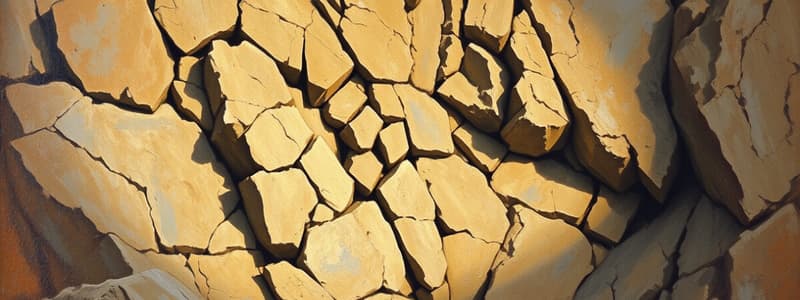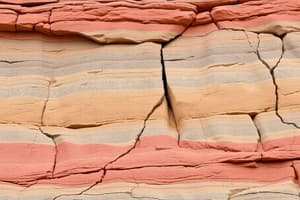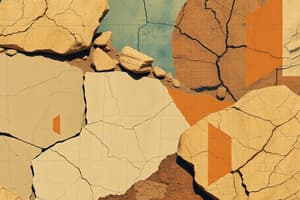Podcast
Questions and Answers
What is chemical weather?
What is chemical weather?
- Water
- Living organisms
- Acid rain
- All of the above (correct)
What is weathering?
What is weathering?
Breaking down of rock and other substances at Earth's surface.
What is erosion?
What is erosion?
Movement of rock particles by wind, water, ice, or gravity.
What are the types of weathering?
What are the types of weathering?
What is the type of weathering in which rock is physically broken into smaller pieces?
What is the type of weathering in which rock is physically broken into smaller pieces?
List the forces of mechanical weathering.
List the forces of mechanical weathering.
What is abrasion?
What is abrasion?
The ice wedging cycle involves water seeping into cracks, then water _____ and expand, then ice widens cracks, and then ice melt.
The ice wedging cycle involves water seeping into cracks, then water _____ and expand, then ice widens cracks, and then ice melt.
Would the process in the cycle diagram in ice wedging work in areas near the Earth's Equator?
Would the process in the cycle diagram in ice wedging work in areas near the Earth's Equator?
What is the process that breaks down rock through chemical change?
What is the process that breaks down rock through chemical change?
List the agents of chemical weathering.
List the agents of chemical weathering.
What is the most important cause of chemical weathering?
What is the most important cause of chemical weathering?
What does oxygen cause in weathering?
What does oxygen cause in weathering?
What does carbon dioxide form?
What does carbon dioxide form?
What is an example of a living organism that contributes to weathering?
What is an example of a living organism that contributes to weathering?
What is acid rain caused by?
What is acid rain caused by?
Water weathers rock by gradually dissolving it.
Water weathers rock by gradually dissolving it.
What process does oxygen weather rock through?
What process does oxygen weather rock through?
List two kinds of rock that are easily weathered by carbonic acid.
List two kinds of rock that are easily weathered by carbonic acid.
How do plants dissolve rock?
How do plants dissolve rock?
What determines the rate of weathering?
What determines the rate of weathering?
The minerals that make up a rock determine how fast it weathers.
The minerals that make up a rock determine how fast it weathers.
What is a rock that is full of tiny connected air spaces said to be?
What is a rock that is full of tiny connected air spaces said to be?
Study Notes
Chemical Weathering
- Involves the breakdown of rocks through chemical changes.
- Key agents include water, living organisms, acid rain, oxygen, and carbon dioxide.
Weathering
- The process of breaking down rocks and other substances at Earth's surface.
- Divided into two main types: physical (mechanical) and chemical weathering.
Erosion
- Refers to the movement of rock particles facilitated by wind, water, ice, or gravity.
Physical (Mechanical) Weathering
- This type of weathering physically breaks rocks into smaller pieces without changing their composition.
Forces of Mechanical Weathering
- Involves actions such as:
- Action of animals
- Abrasion
- Release of pressure
- Growth of plants
- Freezing and thawing
Abrasion
- The grinding away of rocks due to rock particles moved by water, ice, wind, or gravity.
Ice Wedging Process
- Water seeps into cracks in rocks.
- Freeze and expansion of water widen the cracks, followed by melting.
Climate Influence
- Ice wedging is ineffective near the equator due to the absence of freezing temperatures.
Chemical Weathering Agents
- Water is the most significant cause, contributing to the dissolution of rocks.
- Oxygen contributes to rust formation in iron.
- Carbon dioxide reacts with water to form carbonic acid.
- Living organisms, such as lichens, produce acids that aid in rock breakdown.
- Acid rain, stemming from pollution, accelerates chemical weathering.
Rate of Weathering
- Determined primarily by rock type and climate conditions.
- The mineral composition of a rock influences its weathering rate.
Permeability of Rocks
- A permeable rock contains tiny, interconnected air spaces, allowing fluids to pass through easily.
Weathering Facts
- Water gradually weathers rocks by dissolution, underscoring its importance.
- Certain rocks, like marble and limestone, are more susceptible to chemical weathering by carbonic acid.
- Plants dissolve rocks by producing weak acids around their roots.
Studying That Suits You
Use AI to generate personalized quizzes and flashcards to suit your learning preferences.
Description
Test your knowledge on the concepts of rocks and weathering with these flashcards. This quiz includes definitions of chemical weathering, erosion, and the types of weathering. Perfect for students studying Earth Science.




